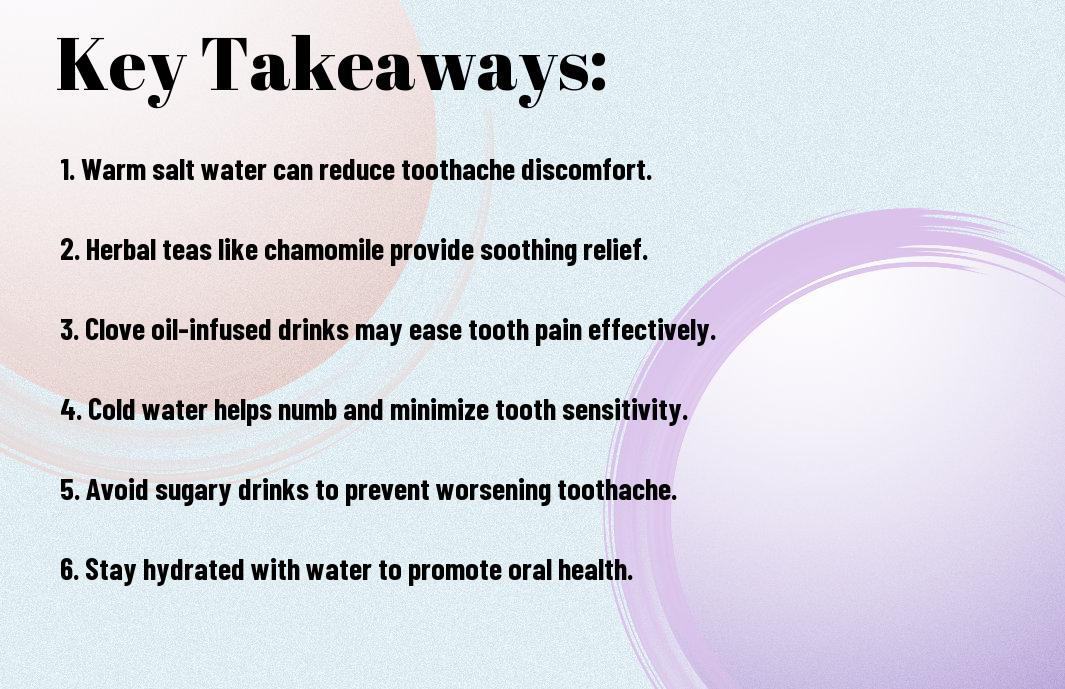Most individuals experiencing a toothache seek immediate relief and wonder what drink can ease their discomfort. While staying hydrated is crucial, certain beverages can provide additional benefits for your oral health during these painful moments. In this post, you’ll discover effective drink options that may help alleviate your toothache. For further guidance, check out How to Treat Your Toothache at Home — Amy H. See, DDS for comprehensive advice.
Key Takeaways:
- Warm Salt Water: A simple solution that can help reduce inflammation and clean the affected area.
- Clove Oil: Known for its analgesic properties, applying clove oil can provide temporary relief from tooth pain.
- Chamomile Tea: Drinking chamomile tea may help soothe discomfort due to its anti-inflammatory properties.
- Cold Compress: While not a drink, applying a cold compress to the outside of the mouth can lessen swelling and numb the pain.
- Hydration: Staying hydrated can help maintain overall oral health and might reduce tooth pain severity.

Understanding Toothaches
Before addressing relief options, it’s important to understand toothaches. They often signal underlying dental issues that need attention. Toothaches can manifest as sharp pain, dull discomfort, or a throbbing sensation, making it challenging for you to eat, sleep, or focus on daily activities. Identifying the pain source can help you find the most appropriate treatment and prevent further complications.
Common Causes of Tooth Pain
Against common beliefs, tooth pain can stem from various issues, not just cavities. Other causes include gum disease, tooth abscesses, cracked teeth, or dental sensitivity due to enamel erosion. Each cause requires appropriate attention, and understanding these can help you manage your pain effectively.
When to Seek Professional Help
Any nagging or intense tooth pain should be taken seriously. If over-the-counter pain relief does not help, or if you experience swelling, fever, or prolonged discomfort, it’s time to consult a dentist. Ignoring these signs may lead to more severe complications, making timely intervention vital for your dental health.
A thorough examination by a dental professional can determine the root cause of your toothache. Depending on the diagnosis, you may require treatments ranging from fillings and root canals to more serious interventions. Taking quick action can help alleviate your pain and prevent future dental issues, ensuring your overall well-being.
The Role of Hydration
There’s a significant link between hydration and oral health that can influence your experience with toothaches. Staying hydrated helps maintain saliva production, which is vital for neutralizing acids, washing away food particles, and supporting your overall dental hygiene. If you’re dealing with a toothache, focusing on hydration can provide comfort and assist in easing your discomfort.
Importance of Fluids for Oral Health
Against the backdrop of tooth pain, the role of fluids becomes apparent. Sufficient intake of water and other hydrating beverages helps to keep your mouth moist, promoting saliva flow. Saliva is beneficial as it helps to remineralize enamel and can aid in protecting against further decay and infection.
Best Beverages for Hydration
Health professionals recommend opting for beverages that are low in sugar and acidity to keep your mouth feeling fresh. Water is, of course, the best choice, but herbal teas and diluted smoothies can also contribute positively. Avoid sugary sodas or drinks that may exacerbate your tooth pain.
Hydration plays an vital role in managing toothaches effectively. By prioritizing water and other beneficial beverages, you can not only alleviate discomfort but also support your overall oral health. Aim to drink plenty of fluids throughout the day, and consider herbal teas like chamomile or ginger for their soothing properties, which may help you feel more comfortable while dealing with dental issues.

Soothing Drinks for Toothaches
Many people find that specific drinks can provide temporary relief from the discomfort of a toothache. Staying hydrated is necessary, but choosing the right soothing options can help alleviate your pain. Natural ingredients found in certain beverages can offer anti-inflammatory benefits and calming effects, making them effective choices for managing tooth discomfort.
Warm Salt Water Rinse
Along with common remedies, a warm salt water rinse can be an effective way to ease toothache discomfort. By simply dissolving a teaspoon of salt in a cup of warm water, you create a solution that helps reduce inflammation and cleanse your mouth, promoting healing. Swishing this rinse around your mouth for about 30 seconds can help alleviate pain and neutralize harmful bacteria.
Herbal Teas and Their Benefits
Before reaching for painkillers, consider herbal teas that can naturally soothe your toothache. Tea varieties like chamomile and peppermint possess anti-inflammatory and analgesic properties that may help with pain relief. Drinking these warm teas allows the beneficial compounds to work effectively, potentially reducing discomfort and promoting relaxation.
Salt has natural antiseptic properties, which make the warm saltwater rinse an excellent choice for alleviating discomfort and improving oral health. This simple solution can help cleanse the affected area, flush out any debris, and reduce swelling. Additionally, the warmth can provide a soothing effect, making it an ideal first step in managing your toothache before seeking other treatments.
Natural Remedies in Beverages
To alleviate toothache, you might consider natural remedies found in beverages. Certain drinks can provide temporary relief by reducing inflammation and numbing the area of discomfort. Incorporating these natural infusions into your routine can help you manage your tooth pain while waiting for professional dental care.
Clove Oil Infusion
Below is a simple clove oil infusion that can help soothe your toothache. Combine a few drops of clove oil with warm water, and swish it around your mouth. This mixture harnesses the natural analgesic and antibacterial properties of cloves to provide effective relief from tooth pain.
Turmeric and Ginger Mix
Below is a preparation using turmeric and ginger, both of which have anti-inflammatory properties. You can create a warm beverage by mixing a teaspoon of turmeric and ginger powder in hot water, adding honey for sweetness if desired. Drinking this concoction may help reduce swelling and discomfort associated with toothaches.
Natural turmeric and ginger mix not only provides relief but also offers a host of other health benefits. Turmeric contains curcumin, a compound known for its anti-inflammatory and antioxidant properties, while ginger can aid in reducing inflammation and pain. By sipping on this soothing drink regularly, you may experience enhanced oral health and a reduction in tooth-related discomfort, all while enjoying its warm, soothing qualities.
Avoiding Irritating Drinks
Now that you are seeking relief from your toothache, it’s necessary to avoid certain beverages that could exacerbate your discomfort. Stay away from anything too hot or cold, as extreme temperatures can trigger sensitivity. Additionally, drinks that are high in sugar or acidity can worsen your symptoms and negatively affect your dental health. Staying mindful of your drink choices can help minimize irritation and promote healing.
Beverages to Steer Clear Of
By avoiding certain beverages, you can better manage your toothache. Stay clear of carbonated drinks, energy drinks, and fruit juices, particularly citrus varieties. Coffee and alcohol can also aggravate your pain, so it’s best to limit or eliminate these from your diet until your toothache subsides.
Effects of Sugar and Acidic Drinks
Among the most irritating factors for a toothache are sugar and acidic drinks. These types of beverages can create an environment where harmful bacteria thrive, leading to inflammation and pain. Moreover, the acidity can erode enamel, further exacerbating your discomfort. The last thing you want is to fuel the problem while trying to find relief.
Another important aspect to consider is the long-term damage that sugar and acidic drinks can cause even when you are not experiencing tooth pain. Regular consumption can lead to cavities and gum disease, making future dental issues more likely. It’s advisable to stick to neutral or soothing drinks that won’t harm your teeth or worsen your current situation. Opting for water or herbal teas can help keep you hydrated without causing additional irritation.
Incorporating Tooth-Friendly Drinks into Your Diet
Not all beverages are harmful to your dental health; in fact, incorporating tooth-friendly drinks into your diet can make a significant difference. These drinks, which typically have lower sugar content and higher nutritional value, can help reduce the risk of tooth decay while keeping you hydrated. Consider drinks like water, herbal teas, and fresh vegetable juices to boost your oral health without causing harm to your teeth.
Daily Drink Choices
Above all, your daily drink choices significantly impact your oral health. Prioritize water as your foundational beverage, as it helps rinse away food particles and neutralizes harmful acids. Unsweetened herbal teas and smoothies made from vegetables can also be complementary to your dental wellness.
Tips for Maintaining Oral Health
The best way to ensure a healthy smile is to adopt a comprehensive oral care routine. You should brush your teeth at least twice a day, floss daily, and schedule regular dental check-ups. Additionally, consider the following practices:
- Limit acidic and sugary beverages.
- Use fluoride toothpaste to strengthen tooth enamel.
- Chew sugar-free gum to stimulate saliva production.
After implementing these suggestions, you can further enhance your oral hygiene routine by being consistent and proactive.
Diet plays an integral role in maintaining your oral health. Foods rich in calcium, such as dairy products or leafy greens, can bolster tooth strength. Likewise, crunchy fruits and vegetables can naturally clean your teeth while providing imperative nutrients. Incorporate these tips into your diet:
- Choose whole fruits over juices to reduce sugar intake.
- Snack on nuts and seeds to promote healthy gums.
- Stay hydrated with water throughout the day.
After considering these dietary recommendations, you will be well on your way to achieving a healthier mouth and brighter smile.
Summing up
Now that you know the benefits of certain drinks for alleviating toothache, consider incorporating warm salt water or chamomile tea into your routine. These options not only soothe inflammation but also offer antibacterial properties. Additionally, clove tea can provide significant relief due to its natural analgesic effects. Always consult with a dental professional for persistent issues, but these drinks can serve as a temporary fix to ease your discomfort and help support your oral health.
FAQ
Q: What type of drink can provide relief for a toothache?
A: Warm saltwater is one drink that can be helpful for relieving toothache pain. The salt in the water can act as a natural disinfectant, helping to reduce inflammation and promote healing. By mixing a teaspoon of salt in a cup of warm water and swishing it around the affected area, you may experience some temporary relief from discomfort.
Q: Are there any herbal teas that can assist with toothache pain?
A: Yes, certain herbal teas can offer soothing relief from toothache. Clove tea is particularly noted for its numbing properties due to eugenol, a natural anesthetic. Sipping on warm clove tea or even steeping whole cloves in boiling water can provide a calming effect on your mouth. Additionally, chamomile tea, known for its anti-inflammatory properties, can also help in easing discomfort when sipped or used as a rinse.
Q: Is there any benefit to drinking cold beverages for a toothache?
A: Cold drinks can sometimes help numb the pain temporarily for some individuals. Ice water or cold herbal tea may provide short-term relief by constricting blood vessels and reducing inflammation in the affected area. However, for others, cold drinks may exacerbate sensitivity and discomfort. It’s important to gauge your personal comfort and adjust accordingly to find what helps best.






